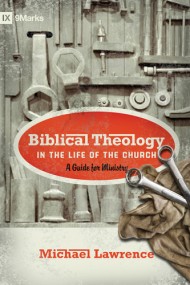The Futility of Unbelief
by Jeff Mindler, Research Assistant “For the wrath of God is revealed from heaven against all ungodliness and unrighteousness of men, who by their...
Systematic theology and biblical theology have traditionally been conceived as somewhat disparate disciplines, constituting entirely different approaches to theology. Biblical theology is held by some to be somewhat suspect, since it originally arose among critics of the Bible. Systematic theology is considered the way to do theology in most institutions, although most who feel this way really can’t tell you why. The answer is rather simple: since the time of the Protestant Scholastics, theology has been structured along the lines of the scientific method. This approach allowed theologians to divide doctrines into separate sections in order to develop a comprehensive body of propositional knowledge of what the Bible teaches about a given subject.
One of the drawbacks of this approach is that Scripture tends to be used in snippets. Removed from their contexts, verses are sometimes used to support theological propositions that they don’t genuinely support. Also, the various topics of systematics can be presented in a manner similar to a child’s blocks—they may be able to be arranged in an interlocking pattern, but they have no organic connection to one another. One of the correctives of the weaknesses of a purely systematic approach is the integration of biblical theology into systematics. This allows the various topics of systematic theology to be more organically related—similar to a tree where the roots feed the trunk, branches and leaves. This idea has recently found more support from systematicians who have been frustrated by the segmentation of the traditional approach.
 In his recent book, Biblical Theology in the Life of the Church (Crossway, 2010), Michael Lawrence proposes ways that a synthesis of these two approaches to theology might be attained. He suggests two ways systematic and biblical theology relate to one another. First, they are related through a common trajectory of authority. Scripture is the authoritative and normative source for theology. Moving from exegesis through biblical theology to systematic theology, Lawrence shows that systematic theology is rooted in sound biblical theology. In this construction, “biblical theology tends to be more foundational, while systematic theology both builds on the results of systematic theology and is itself guided by the interpretive horizons established by biblical theology” (p. 91).
In his recent book, Biblical Theology in the Life of the Church (Crossway, 2010), Michael Lawrence proposes ways that a synthesis of these two approaches to theology might be attained. He suggests two ways systematic and biblical theology relate to one another. First, they are related through a common trajectory of authority. Scripture is the authoritative and normative source for theology. Moving from exegesis through biblical theology to systematic theology, Lawrence shows that systematic theology is rooted in sound biblical theology. In this construction, “biblical theology tends to be more foundational, while systematic theology both builds on the results of systematic theology and is itself guided by the interpretive horizons established by biblical theology” (p. 91).
Second, the two approaches are related through a trajectory.
Biblical theology immerses us in the storyline of the Bible in order to describe the Bible’s teaching in its own terms. It is a hermeneutical discipline; a way of reading and studying the Bible. The end of biblical theology, therefore, is an internally coherent understanding of the Bible. Systematic theology synthesizes the Bible’s worldview…The end of systematic theology, therefore, is an externally rational articulation of the truth (p. 91-2).
In the end, says Lawrence, we can’t have one without the other.
Biblical theology is how we read the Bible. Systematic theology is how the story of the Bible is shown to be normative in our lives. To say that you want one but not the other simply shows that you understand neither. Everyone has both a systematic theology and a biblical theology, whether they realize it or not. What we want, though, is for both to be faithful to the Scriptures—the biblical story and the biblical worldview. We won’t understand that worldview if we don’t understand the story out of which it arises. But if all we have is a story, how will that story ever engage the contemporary concerns of our own lives? (p. 92)
The proposal, then, is not to do away with systematic theology, but rather to integrate biblical and systematic theology more intentionally, so that the biblical narrative and the unfolding of progressive revelation shape our approach to systematizing theology. If you want to see a biblical theology that takes systematic theology into consideration, see D. A. Carson’s new book, The God Who Is There (Baker, 2010). If you want to see a systematic theology that integrates biblical theology, you’ll have to attend theology classes either online or in residence at Calvary Baptist Seminary where I teach!
by Jeff Mindler, Research Assistant “For the wrath of God is revealed from heaven against all ungodliness and unrighteousness of men, who by their...
by Jeff Mindler, Research Assistant at Apologetics for the Church “Everyone then who hears these words of mine and does them will be like a wise man who built...
The confession that a man, named Jesus, is the Christ, the Only-Begotten of the Father, is in such direct conflict with our experience and with all of our...